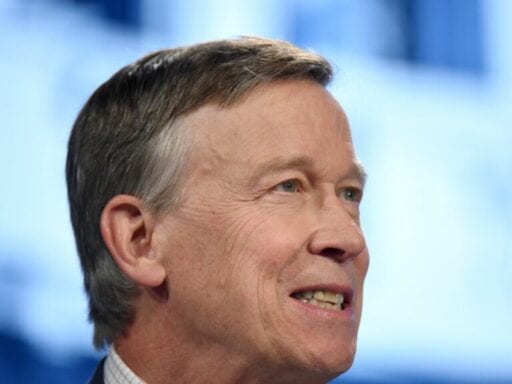The former Colorado governor thinks he’s the centrist candidate to take on Trump.
Former Colorado Gov. John Hickenlooper, much like Sen. Amy Klobuchar, made the case that a centrist Democrat should be the party’s 2020 pick Wednesday night during a CNN town hall.
Hickenlooper leaned heavily into his experience as his state’s top executive to highlight his ability to work across competing interests and push through key policies, including more stringent gun control and environmental regulations.
He argued that his work as governor could make him the right person to attempt to unseat President Donald Trump.
“In Colorado, I’ve been able to bring people together on many sides of the fence and find collaborative solutions,” he said. “We got the oil and gas industry to sit down with the environmental community… to create the first methane regulations in the country.”
Hickenlooper, a geologist turned brewpub-owner turned politician, does have a track record of working with Republicans on issues including expanding Medicaid in Colorado. He was able to steer the policy through a split legislature and secure health care for an overwhelming majority of state residents. But, as Vox’s Tara Golshan writes, his record is one that’s filled with some contradictions. While Hickenlooper did help advance methane rules aimed at curbing pollution, for example, he has also pushed back on regulations that would have kept oil companies farther away from homes, schools, and parks.
Hickenlooper is making the bet that some of his bipartisan bona fides could sway voters fed up with broader polarization. But he wasn’t afraid to criticize Trump directly in certain moments — like when one voter asked about the rise of white nationalism.
Hickenlooper: “I think President Trump should be ashamed of himself” over white nationalism comments https://t.co/WqFPwIY1pv #CNNTownHall pic.twitter.com/FUf9ZYYd3H
— CNN Politics (@CNNPolitics) March 21, 2019
He also shied away from fully endorsing some key progressive priorities: Although he spoke in favor of universal health care and free community college, he stopped short of endorsing Medicare-for-all and free college.
Here are three key moments from the town hall.
1) He thinks states should take the lead on marijuana legalization
Colorado, under Hickenlooper, was one of the first states to legalize recreational marijuana, and while he may have initially opposed this step, the governor indicated that he’s come around and now thinks other states should be able to do the same.
“Most of our fears haven’t come true. We haven’t seen a spike in consumption,” he said. “I think it’s so much better than the old system when we sent millions of kids to prison…where states do legalize marijuana, the federal government should get out of the way.”
Instead of supporting a national law legalizing marijuana, something that Sen. Cory Booker (D-NJ) has proposed, however, the former governor advocated for states to address the issue themselves. He does think the federal government could get involved in some ways, though: Hickenlooper added that he thinks there should be “one system nationwide for medical marijuana.”
2) He doesn’t back Medicare-for-all, though he supports a public option
Hickenlooper said he supported a path to universal health care coverage, but did not back Medicare-for-all.
“We are almost-universal coverage in Colorado, we’re at 95 percent,” he said, noting that this coverage was due to a combination of different policies including the expansion of Medicaid and setting up some of the most “innovative” health care exchanges in the country.
That puts him into the less aggressive category of plans that Democrats have currently proposed to expand health care in America. As my colleagues Sarah Kliff and Dylan Scott explained after reviewing the nine proposals put forward so far, “there are some that would replace private insurance and cover all Americans through the government. Then there are the others that would allow all Americans to buy into government insurance (like Medicare or Medicaid) if they wanted to.” Hickenlooper is the latter.
“I don’t agree with Sen. [Bernie] Sanders and the single-payer approach,” the former governor said. “I understand that we need a public option. Unlike Medicare-for-all, which would guarantee government-run insurance coverage for all Americans, a public option would mean that the government offers its own alternative to private insurance.”
Hickenlooper emphasized that many people are currently satisfied with their employer-provided plan and highlighted this factor as a major obstacle for the potential implementation of Medicare-for-All.
“I mean there are over 150 million people that [have employer-sponsored insurance] — I can’t imagine how we would pull them off of health care coverage that in most cases they like,” he said.
3) When asked why voters should choose him over a woman or person of color, Hickenlooper said he brings unique experiences to the table
Hickenlooper, like several of the other white men seeking the Democratic nomination, was asked why voters should choose him over a woman or candidate of color. His answer, while it sought to flip existing gendered expectations, somewhat missed the mark.
“Diversity is certainly the greatest strength of the Democratic party and I celebrate that,” he asked. “As I said, I’m running for president because I think I’ve got a different set of experiences than many people and I’ve been able to bring people together again and again while I was in government, and when I was in small business.”
CNN anchor Dana Bash followed up by asking if Hickenlooper would commit to considering a woman as his vice presidential running mate.
“Of course, but … I’ll ask you another question,” he said. “But how come we’re not asking, more often, women whether they’re willing to put a man on the ticket?”
“When we get to that point, I’ll ask you that question,” Bash shot back.
Hickenlooper: Why are female Democratic candidates not being asked if they’d pick a man as VP? https://t.co/9aOQjeGIwS #CNNTownHall pic.twitter.com/EpinWcRBkk
— CNN Politics (@CNNPolitics) March 21, 2019
Author: Li Zhou
Read More



